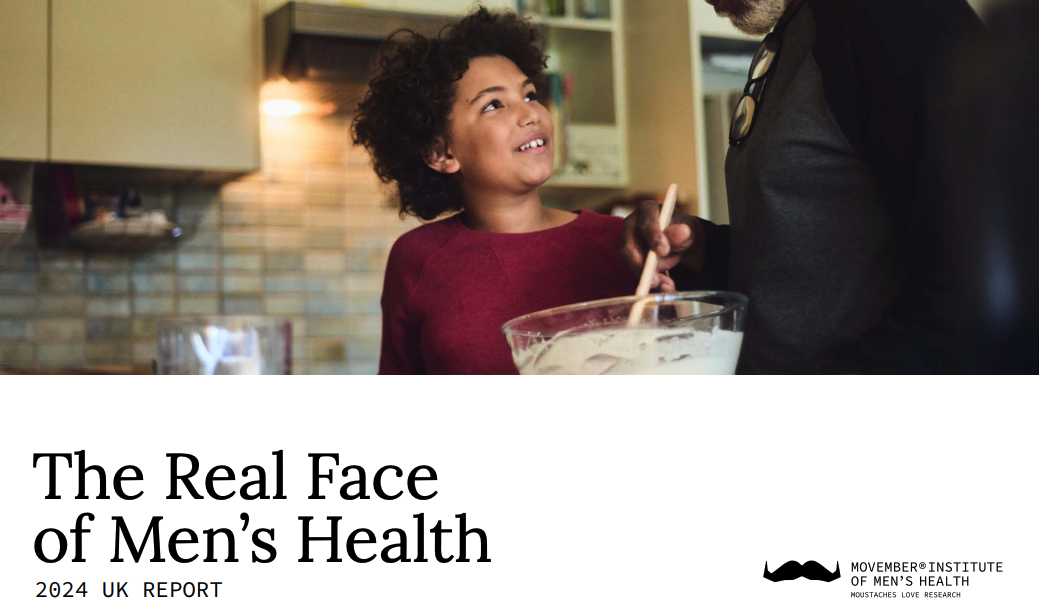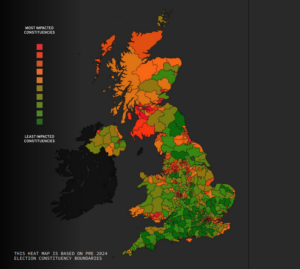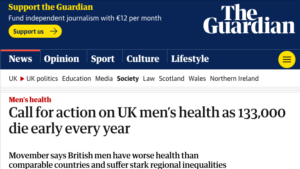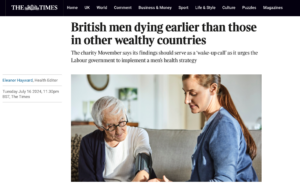
By Iona Cable
Two in five men in the UK will die before they celebrate their 75th birthday. That’s over 133,000 men who die too young each year, and often from causes which are entirely avoidable. We partnered with leading men’s health charity Movember to produce ‘The Real Face of Men’s Health report’, which launched in July. The report calls on UK governments to implement men’s health strategies across England, Scotland, Wales and Northern Ireland.

The report contains new data which reveals shocking disparities across the UK. In the most deprived 20% of the country men are 81% more likely to die prematurely than those in the wealthiest. In one constituency, Glasgow North East, men are nearly twice as likely to die before they reach 75 than women. You can find out how your constituency compares using the interactive map here. New polling of those who care for these men finds that 41% of people who are informal caregivers have to leave or change a job to support the man they care for.
The key message is that when we improve men’s health the benefits ripple through families, communities and societies. And this message resonated, with over 150 stories on the report featured in national, regional and local news across the UK, including The Times, the Daily Mail, The Guardian, The Sun, The Mirror, the Independent, the Daily Express, Wales Online, Scottish Sun, Glasgow Live and Birmingham Mail. It was endorsed by high level figures including political strategists and co-hosts of The Rest is Politics podcast Alastair Campbell and Rory Stewart.


Given the report launched on a heavy news day in the UK- the day of the 2024 King’s Speech – this coverage was a remarkable achievement. It’s a testament to how many are familiar with this story – too many people know men who have died too young, or know the repercussions of men’s poor health across their family, work, and community.
The faces of men’s health are not only men, but all those around them, those who care for them, who work with them, are friends with them, love them, and who are impacted by their health. Action must be taken, and the report lays out clear recommendations for UK governments in England, Wales, Scotland and Northern Ireland to turn the tide on men’s health by delivering national men’s health strategies. These should respond to men in all their diversities, and:
- Support men’s health literacy so that men are well equipped to get the care they need, when they need it.
- Respond to demand by transforming the health system and workforce to have the capacity and skill to respond to the needs of men, in all their diversities.
- Undertake research to understand how men engage with their health and the health system.
The report focused on the impact of gender on health. On average, men die before women while women spend a significantly greater proportion of their lives in ill health. Additionally, trans and non-binary people have disproportionately worse health outcomes compared with the general population. None of these things are ok. Gender is a social determinant of health, and Movember calls for governments to invest in gender responsive healthcare that fully responds to the needs of women and LGBTQI+ people as well as men.
This is a cause close to so many people’s hearts – over the past 5 years, in the UK alone, 2.1 million people have fundraised for or donated to Movember. We are proud to have worked with them to produce this vital piece of research.
